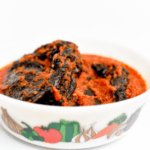“Cooking with Authentic African Ingredients: Where to Find Them” is the topic of discussion in this post. Join us at Kabaia as we explore the undiscovered locations where you may obtain these extraordinary ingredients, taking your taste senses to the vibrant marketplaces of Lagos, the spice-filled souks of Marrakech, or the lush fields of Cape Town.
We can satisfy your cravings for the zesty tastes of North African tagines, the fragrant combination of spices in West African stews, or the heartfelt simplicity of South African braais.
Get ready to delve into the vast internet retail space, uncover the vivid tapestry of farmers’ markets, and find the hidden jewels of neighborhood African grocery shops. Additionally, we’ll teach you how to access the extensive expertise and social networks of African immigrants, ensuring that your culinary journey is full of sincerity, shared traditions, and friendly relationships.
Where to Find the Authentic African Ingredients


1. Local African Grocery Stores
For African immigrants and cuisine aficionados looking for genuine ingredients to reproduce the tastes of their country, local African grocery shops are a sanctuary. In this regard, African Foods in Toronto, Canada, stands out. This well-liked store sells a wide variety of goods, including necessary grains like fufu flour and couscous, fragrant spices like suya seasoning and berbere, and a selection of fresh fruits, vegetables, meats, and seafood. Safari in Houston, Texas
In the USA, African Store has established itself as a top source of authentic African ingredients. This shop has a wide variety of foreign commodities, including yams, plantains, palm oil, and jollof spice.
Another noteworthy business is Calgary’s Pepe African Market, which makes sure that African immigrants and food connoisseurs have access to unusual items like cassava and okra, as well as customary snacks and sauces.
The African Market of Louisville in Louisville, Kentucky, is a well-kept secret that sells smoked meats, dried fish, and specialty spices like egusi and suya pepper. Lastly, to meet the varied demands of the African population, Ottawa’s Iyapo African Market offers a wide selection of genuine spices, herbs, flours, and pantry essentials.
Discovering these neighborhood African markets immerses you in the lively ambiance and welcoming ambience while supplying the goods needed to prepare delicious African meals in your own home.
2. Online Retailers
The way individuals access and buy authentic African ingredients has been transformed by online sellers, making it simpler than ever to go out on a culinary expedition from the comfort of your home.
AfroMarket.com is yet another renowned internet merchant. This online store is devoted to exhibiting gastronomic, cultural, and ingredient goods from Africa. AfroMarket.com provides a wide range of pantry essentials, including different kinds of cereals, flours, and spices, to meet the varying culinary demands of African immigrants and connoisseurs.
The portal also promotes a feeling of community by offering recipes, cooking advice, and content that honors Africa’s rich culinary legacy. AfroMarket.com is a trustworthy resource for locating the essential components required to prepare really authentic African recipes because of their dedication to quality and authenticity.
Regardless matter where you are, by investigating these internet merchants and others like them, you have access to a wide variety of authentic African ingredients. You may start a gastronomic adventure packed with the colorful tastes and cultural diversity of African cuisine thanks to the convenience of online shopping and the commitment to finding genuine items.
Therefore, these online merchants bring the spirit of Africa to your kitchen, enabling you to explore, experiment, and enjoy the delights of African cuisine, whether you’re looking for rare spices, distinctive sauces, or specialty pantry products.
3. Farmers’ Markets
Farmers’ markets are a lovely way to discover new African foods while promoting regional farmers and environmentally friendly agricultural methods. These lively gathering places in the neighborhood are veritable gardens of seasonal vegetables, presenting a wide range of African delicacies that might improve your culinary endeavors. Farmers’ markets provide a direct link to the source of these goods, from the verdant greens of West African cuisine to the vivid fruits and vegetables seen in East African recipes.
You may interact with the farmers there and get more knowledge about the origins and growing practices of the authentic African ingredients you’re looking for by going to your local farmers’ market.
Okra, callaloo, plantains, and other typical African vegetables are common ingredients offered by specialist vendors that specialize in serving African food. By making your purchases from these farmers, you help support the neighborhood economy and sustainable farming techniques while also ensuring the quality and freshness of the items.
Make it a routine to frequent local farmers’ markets since the selection varies with the seasons. Accept the chance to learn about fresh and intriguing African foods while assisting regional farmers and taking in the lively ambiance of these crowded marketplaces. Make use of fresh, locally obtained African ingredients to inspire your culinary creativity and elevate your food to new levels of taste and authenticity.
4. Community Networks
Community networks are essential for introducing people to real African foods and developing a feeling of gastronomic community. You may enrich your culinary adventure by interacting with the local African community, which offers a plethora of information, resources, and shared experiences. There are chances to engage with other African cuisine fans and pick their brains via community meetings, social media groups, and cultural events and festivals.
Participating actively in these community networks gives you access to useful information on where to acquire authentic African ingredients in your neighborhood. African immigrants who have already made a name for themselves in the neighborhood often have insider knowledge about neighborhood markets, specialized shops, and undiscovered treasures that specialize in African food. These relationships might be useful for finding trustworthy suppliers of materials that might be hard to locate otherwise.
Your culinary discovery of African cuisine is enhanced by the sharing of expertise within these community networks, which also builds a feeling of belonging and forges significant relationships.
5. Growing Your Own Ingredients
It is a pleasant and exciting adventure to start cultivating your own African ingredients. It enables you to actively participate in growing the tastes and ingredients that are essential to African cooking. It is possible to produce many African herbs, vegetables, and fruits both inside and outdoors, making it available to a variety of gardening aficionados.
You get a stronger connection to the cultural importance and culinary customs of the plants by cultivating your own African ingredients. For instance, you may grow hibiscus flowers that are used to make energizing drinks like sorrel or amaranth, a leafy green popular in African cuisine. It is a rewarding experience to grow these plants from seeds or seedlings to full maturity since it increases your understanding of the components and the labor involved in their production.
Having a garden of African foods gives you a fresh and ready supply for your culinary innovations in addition to the delight of cultivating your own food. To ensure the greatest degree of freshness and quality in your meals, you may easily stroll into your backyard or kitchen garden and collect items like cassava, moringa leaves, or African eggplant. You may totally immerse yourself in the tastes of the continent and set off on a culinary trip right from your own house if you grow your own African foods and ingredients.
Conclusion
The first step in embracing the vivid tastes of African food is to find genuine ingredients. You may immerse yourself in the culinary traditions of Africa by perusing neighborhood African grocery shops, using internet vendors, going to farmers’ markets, interacting with the African population, and even cultivating your own food.
Authentic African ingredients are becoming more widely available in Canada and the USA as consumer demand for them rises. This makes it simpler than ever to go on a culinary journey that honors the rich range of African tastes. So be ready to roll up your sleeves, grab your supplies, and let the wonderful and lively world of African food into your kitchen.




